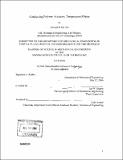Conducting polymer actuators : temperature effects
Author(s)
Del Zio, Michael R. (Michael Robert), 1982-
DownloadFull printable version (14.07Mb)
Other Contributors
Massachusetts Institute of Technology. Dept. of Mechanical Engineering.
Advisor
Ian W. Hunter.
Terms of use
Metadata
Show full item recordAbstract
In order to utilize conducting polymer actuators as a viable engineering solution, it is necessary to produce usable levels of force with a reasonable bandwidth. Polypyrrole actuated at temperatures as high as 100 °C increases stress magnitudes by as much as 4x and stress rates by 5x. The effect is caused by a combination of decreased solution resistance and increased ion diffusion within the polymer. However, these temperatures cause accelerated degradation due to the time-temperature correlation common to viscoelastic polymers. Actuation at these temperatures can decrease cycle life by as much as 20x. Excessive heating without actuation can also result in poor actuator performance. Impedance spectroscopy coupled with electro-mechanical analysis highlighted previous results and also showed an improved frequency response from actuation at high temperatures.
Description
Thesis (S.M.)--Massachusetts Institute of Technology, Dept. of Mechanical Engineering, 2006. Includes bibliographical references.
Date issued
2006Department
Massachusetts Institute of Technology. Department of Mechanical EngineeringPublisher
Massachusetts Institute of Technology
Keywords
Mechanical Engineering.